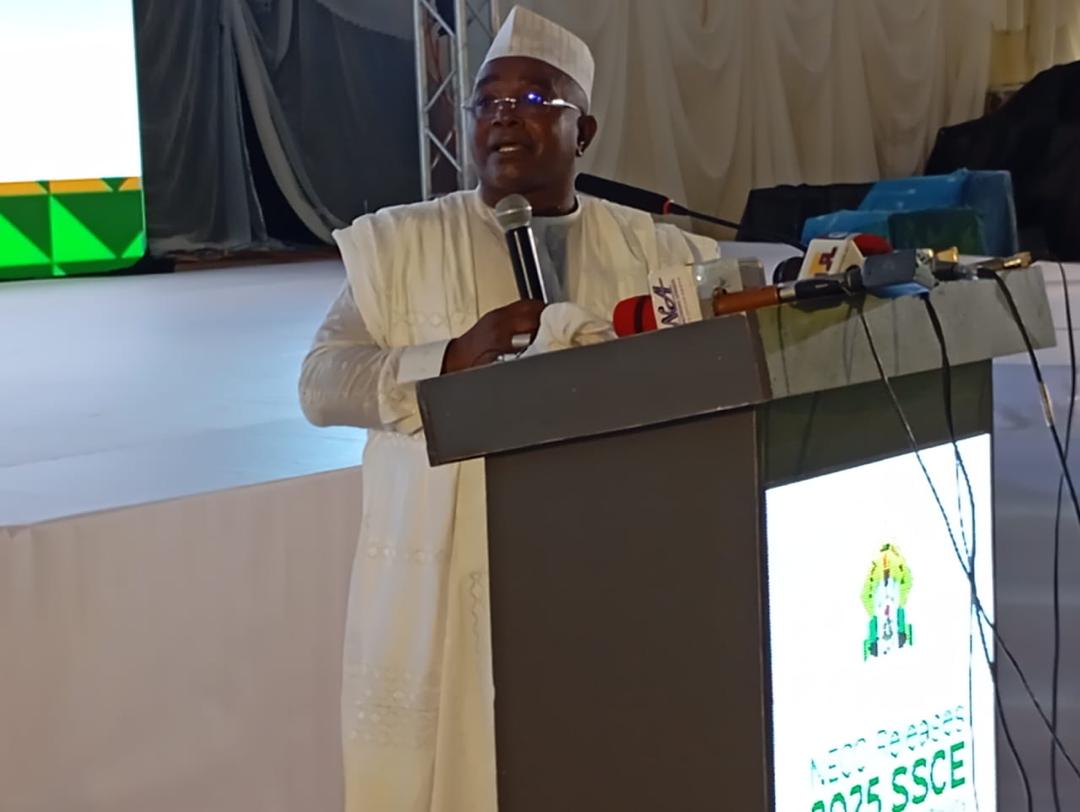Education
NECO releases 2025 SSCE internal results

Mariam Sanni
The National Examinations Council, NECO, has released the 2025 Senior School Certificate Examination, SSCE internal, results, 54 days after the last written paper.
NECO Registrar, Prof Ibrahim Wushishi, who announced the release of the results in Minna, Niger State on Wednesday, said out of the 1,358,339 candidates who sat for the June/July exercise, 818,492, representing 60.26 per cent scored 5 credits and above, including Mathematics and English.
Wushishi stated that the number of candidates with five credits and above, irrespective of Mathematics and English is 1,144,496 representing 84.26 per cent.
“Number of candidates that registered for the examination is 1,367,210 representing 685,514 Males and 681,696 Females.
“Number of candidates that sat is 1,358,339 representing 680,292 Males and 678,047 females.
“Number of candidates with five Credits and above, including Mathematics and English is 818,492 representing 60.26%.
“Number of candidates with five Credits and above, irrespective of Mathematics and English is 1,144,496 representing 84.26%,” he said.
Recall that the 2025 Senior School Certificate Examination was conducted from Monday 16th June to Friday 25th July, 2025.
Wushishi stated that the number of candidates with special needs was 1,622 out of which candidates with hearing impairment were 586 Males and 355 Females, and candidates with visual impairment were 111 Males and 80 Females.
On the number of examination malpractice cases, the registrar noted that in 2025 SSCE internal, the number of candidates involved in various forms of malpractice 3,878, as against 10,094 in 2024, which shows a reduction of 61.58 per cent.
He further disclosed that “During the conduct of the 2025 Senior School Certificate Examination (SSCE), 38 schools were found to have been involved in whole school (Mass) cheating in 13 States. They will be invited to the Council for discussion, after which appropriate sanctions will be applied.
“Similarly, nine (9) Supervisors: 03 in Rivers, 01 in Niger, 03 in FCT, 01 in Kano and 01 in Osun States were recommended for blacklisting due to poor Supervision, Aiding and Abetting, Lateness, Unruly behavior, Assault, and Insubordination.
“I wish to also draw your attention to a case in Lamorde Local Government, Adamawa State involving eight (08) Schools which were affected by a communal clash resulting in the disruption of our examinations from 7th to 25th July, 2025. A total of thirteen (13) Subjects and twenty-nine (29) Papers were involved.
“We have since commenced talks with the State Government with a view to conducting the examinations for the affected Schools.”
He announced that in view of the reviewed curriculum which is currently being implemented, NECO will conduct SSCE examination on only 38 subjects which will reduce the waiting time for the results.
While providing a breakdown of performance by states, he noted that Kano came top with 68,159, representing 5.020 per cent candidates scoring five credits and above including English and mathematics.
Lagos came second in performance with 67,007 or 4.930 per cent of candidates, scoring five credits and above including English and mathematics, while Oyo came third with 48,742 candidates scoring five credits and above including English and mathematics.
The least performing centre was Gabon with no candidate scoring five credits and above including English and mathematics.
Education
Nigerian Teen Makes Historic Breakthrough in $400,000 Global Science Competition

A brilliant young Nigerian student, Daniel Adeluy ihas advanced to the semi-finals of the 2025 Breakthrough Junior Challenge, which is one of the world’s most prestigious global science competitions for teenagers.
From thousands of entries worldwide, only 30 semi-finalists were selected, and Daniel is the first Nigerian in the competition’s 11-year history to reach this remarkable stage.
Daniel’s submission, a visually engaging, two-minute video, explains wormholes in a simple and intuitive way. Why wormholes? In his words:
“For me, wormholes represent a path to reaching the seemingly unreachable. I’ve always been a curious person and an avid reader and books about space, physics, and the mysteries of the universe fascinate me. I find it interesting that physics can turn ideas that seem impossible into things that could be real. I love adventure, and my passion for science and media intersected perfectly in the Breakthrough Junior Challenge.”
The stakes are enormous:$250,000 university scholarship for the winner$50,000 prize for the teacher.
$100,000 state-of-the-art science laboratory for the school.
Daniel is on the verge of making history, and he needs public support to reach the finals.He has developed interests across academics, leadership, and creative activities.
He previously served as the Assistant Head Boy at Brickhall School Abuja, where he received the Chairman’s Award for Academic Excellence during his graduation ceremony. Daniel captains his estate’s U18 football team and also enjoys basketball.
In addition, he taught himself to play the keyboard and has composed a number of original pieces, reflecting his willingness to explore different skills and hobbies.
Daniel is the founder of BRAINS (Building Real-world Artificial Intelligence and Next-generation Skills), a youth-focused nonprofit that provides children with early exposure to artificial intelligence and emerging technologies.
His mission is to help younger students develop confidence and curiosity about the future of work.
A Passion for Learning, Storytelling, and Discovery.
Daniel credits his communication skills to his habit of consuming high-quality educational content.
He frequently watches National Geographic and history documentaries, and enjoys reading scientific classics such as A Brief History of Time by Stephen Hawking.These resources, he says, shaped his ability to connect complex ideas and present them in clear and engaging ways, skills essential to the Breakthrough Junior Challenge.
Since 2021, Daniel has also volunteered in his church (The Capital Assembly’s) media unit, where he gained hands-on experience in storytelling and content production. These skills played a direct role in the polished science video that earned him global recognition.
Call for Public SupportTo advance to the final round, Daniel needs likes on his video posted on both the Breakthrough Prize Facebook page and YouTube channel.The submission with the highest combined engagement gets a guaranteed spot in the finals.
Daniel is calling on Nigerians at home and abroad to support his journey.“I would be very grateful if people would watch my video and like it on both platforms if they enjoy it,” he said.
-

 Featured6 years ago
Featured6 years agoLampard Names New Chelsea Manager
-

 Featured6 years ago
Featured6 years agoFG To Extends Lockdown In FCT, Lagos Ogun states For 7days
-

 Featured6 years ago
Featured6 years agoChildren Custody: Court Adjourns Mike Ezuruonye, Wife’s Case To April 7
-

 Featured6 years ago
Featured6 years agoNYSC Dismisses Report Of DG’s Plan To Islamize Benue Orientation Camp
-

 Featured4 years ago
Featured4 years agoTransfer Saga: How Mikel Obi Refused to compensate me After I Linked Him Worth $4m Deal In Kuwait SC – Okafor
-
Sports3 years ago
TINUBU LAMBAST DELE MOMODU
-

 News11 months ago
News11 months agoZulu to Super Eagles B team, President Tinubu is happy with you
-
Featured6 years ago
Board urges FG to establish one-stop rehabilitation centres in 6 geopolitical zones
